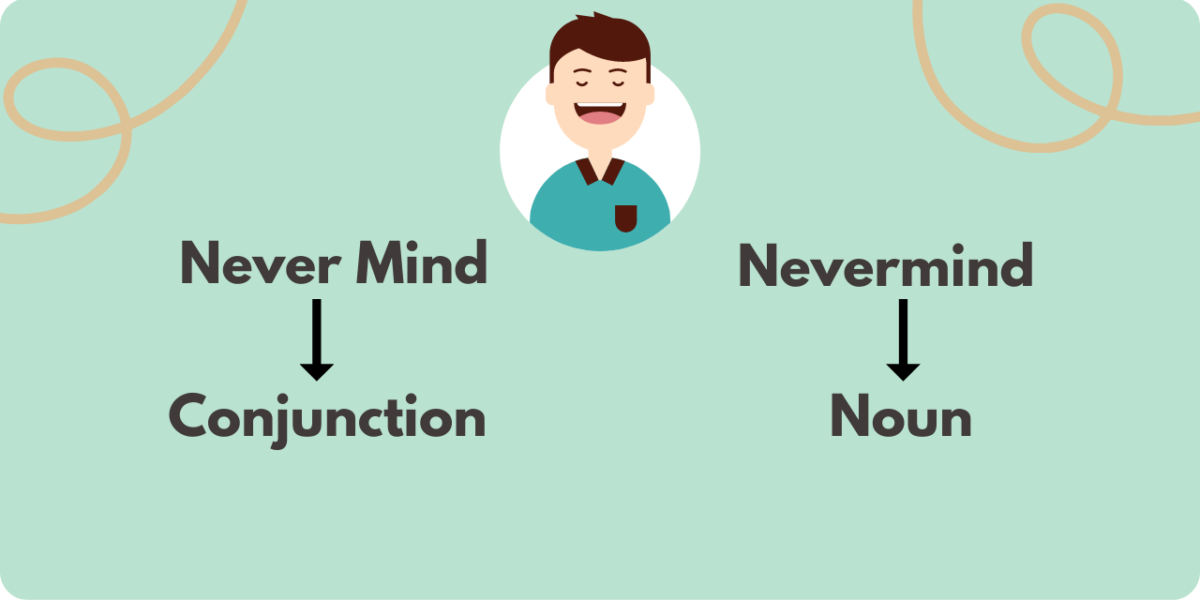Some English language relationships are so interesting and intricate. Take never mind, for instance. Is it never mind or nevermind? The simple variance in these two terms is enough to make them function differently.
In short, when never mind is used as two words, it acts as a conjunction, meaning something like “let alone.” It essentially communicates that something or someone should be disregarded. In comparison, when nevermind is used as a singular word, it acts as a noun that means “no concern” or “least concern.”
In most cases, never mind is most common as two separate words. However, the singular noun version has seen more usage in recent years. On top of this, other shorter abbreviations, such as nvm, have also been created with the advent of texting and emailing.

How to Use Never Mind as a Conjunction
As a conjunction, never mind acts to link clauses, phrases, or even entire sentences together. It can be incredibly unique and variable in usage. For instance, it could mean “think of less” or simply “leave alone.”
Additionally, it can be used in negative sentences preceding an idea. When used in this manner, it usually denotes when something is not likely to happen. For instance:
- After my last workout, I can barely walk, never mind jog.
- I can’t bear to look at you, never mind talk.
Lastly, never mind can also be used as a stand-alone imperative to tell people to disregard something. For example:
- Never mind doing the dishes. I already did them earlier.
- You know what, never mind.
- Have you seen Jeremy? Ah, never mind.
Here is an example from the media:
Americans are feeling deep contempt for the two major political parties. Never mind all that. Political conventions are about big speeches, funny hats and packed swag bags, and they are also moneyed and decadent affairs. – New York Times.
How to Use Nevermind as a Noun
When used as a single-word, nevermind functions as a noun meaning “attention” or “concern.” Similarly to the other version, it is only used to imply disregard or dismissal of something in a negative way.
- Don’t give him any nevermind. He’s not even worth your time.
- With no nevermind of yours, you should be leaving.
Here is an example from the media:
Then the advisors decide that Mr Lieberman is too risky because he is pro-choice, nevermind that a lot of the Republican voters question Mr McCain’s pro-life credentials in the first place, and nevermind that the campaign is explicitly open to a “high-risk” candidate.Overall it is a very strange account. – the Economist
What is the Origin of Never Mind?
Never mind originated from two separate words, never and mind.
To begin, never functions as an adverb, originating from Old English in the late 1700s. In its original form, it meant “at no time.” For instance:
- I have never eaten sushi.
- Never talk to me like that again.
- I am never going sky diving.
Mind acts as a verb that is used idiomatically. Additionally, it is usually used negatively, describing when someone should not use their mind in a specific way. When thought of as a noun, mind can also be used colloquially in phrases such as “pay them no mind,” which means to not think about someone.
- Mind your manners at the dinner table.
- Don’t mind me; I’m just trying to make my way through the crowd.
- Pay some mind to your homework tonight.
Putting these two words together, it should be clear that never mind is another way of saying ‘to use your mind at no time for a specific thing.’
Modern Day Never Mind Abbreviations
As mentioned, with the popularity of fast messaging, there have been some new adaptations of never mind. For the most part, these adaptations come in the form of abbreviations to shorten the word so that it is more applicable for texting and social media.
As you can probably guess, this slang version of never mind is informal and could cause some confusion, so you should avoid using it in formal writing, such as reports or essays.
The most common abbreviation is nvm (sometimes capitalized). However, some opt for something even shorter and use nm (sometimes capitalized).
In the technological world, these abbreviations usually mean “disregard my last text” or “disregard my last thought.” For example:
- I was going to ask you where dad was, but nvm.
- Nm, I don’t need to know the passcode anymore.






